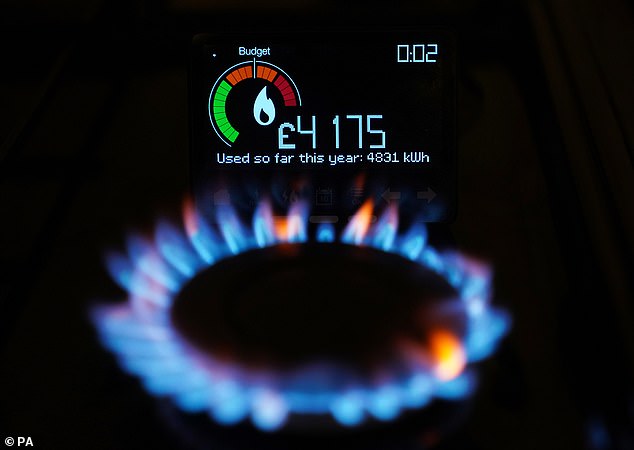In January last year I agreed to install a smart meter after much support from my energy supplier.
However, last month I started experiencing problems with the monitor and have now discovered that it is faulty and needs to be replaced.
My supplier says they only offer free replacements within the first 12 months, so I’ll have to pay for a new one. It’s right?
Edward Green, Norwich.
Dean Dunham responds: Your energy supplier cites a rule imposed by the regulator, Ofgem, which states that energy companies are only required to repair or replace your internal monitor if it proves faulty in the first 12 months after delivery.
Bug: A reader is asked to pay for a new smart meter after his original unit developed a problem with its display
After this, it can charge you for providing a new one.
However, this is just Ofgem’s rule and my view is that it potentially goes against the Consumer Rights Act, which is not legal.
This Law applies to four types of contractual scenarios, two of which clearly do not apply here, but the other two do.
The first applies when there is a sale of goods (in this case, the smart meter and monitor) for money.
Every piece of information you will find online, from government information on smart meters to energy supplier websites, will tell you that there is no “upfront charge” for smart meters and therefore may lead you to believe that they are free.
For this reason, most believe that no sales contract is formed and therefore the Consumer Rights Act would not apply.
However, this does not mean that they are free because, possibly, you pay for them, even if it is not in advance.
Some online sources, including the Energy Saving Trust, a British organization that promotes energy efficiency, state: “Smart meters are completely free.” . . Your energy supplier will recover the costs through your energy bills over time.”
This would suggest that providers charge a charge within your regular bill. If your supplier does this, the Consumer Rights Act will apply.
The second scenario that may apply is when there is a “contract of transfer of goods”.
This is defined in Section 8 of the Consumer Rights Act as where ownership of the goods passes to the consumer and there is some form of “consideration” other than the payment of money.
In this case there would be, since the compensation is that the consumer accepts the smart meter.
Thus, unless the meters: i) remain the property of the energy supplier at all times and/or; ii) there is absolutely no charge to the consumer, my opinion is that the Consumer Rights Law will apply.
In this case, consumers will be entitled to free repair or replacement even after 12 months if the problem is a fault and not damage caused by the consumer and it will also mean that the regulator’s rule is contrary to consumer laws.
- Have you been charged to repair a faulty smart meter? Email moneymail@dailymail.co.uk
I can’t get a refund for my coat.
I returned a coat and after waiting five weeks for a refund, I filed a chargeback claim.
My bank has now rejected this, saying there is no breach of contract as the retailer agreed to refund me. What should I do now?
Francis Taylor, Nottingham.
Dean Dunham responds: Your bank is correct in citing that the remedy you are entitled to in these circumstances, under the Consumer Rights Act, is a refund.
However, just because a refund has been promised doesn’t mean you have no further rights, and in fact, there is a breach of contract here, so your bank was wrong to deny your chargeback claim.
According to article 45 of the law, the merchant must refund the money within 14 days. This obligation that the law imposes on the merchant becomes a condition of the contract with the consumer.
In this case, it is clear that the merchant has not paid you within 14 days and therefore this amounts to a “breach of contract”.
The only exception would be if the merchant disputes the refund, as the 14-day period would not begin until their right to a refund had been demonstrated.
Go back to your bank and explain this breach of contract. If they still reject your chargeback, file a complaint with the Financial Ombudsman Service.
If the facts are as you explain, this will be successful and your bank will have to pay. You should also continue to seek reimbursement.
- Write to Dean Dunham, Money Mail, Scottish Daily Mail, 20 Waterloo Street, Glasgow G2 6DB or email d.dunham@dailymail.co.uk. The Daily Mail cannot accept any legal responsibility for the responses given.
Some links in this article may be affiliate links. If you click on them, we may earn a small commission. That helps us fund This Is Money and keep it free to use. We do not write articles to promote products. We do not allow any commercial relationship to affect our editorial independence.


